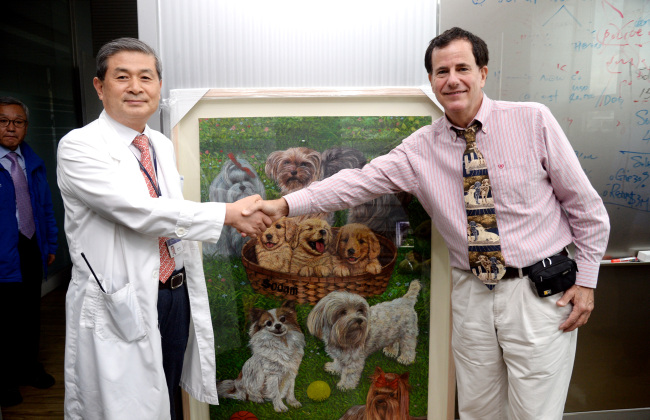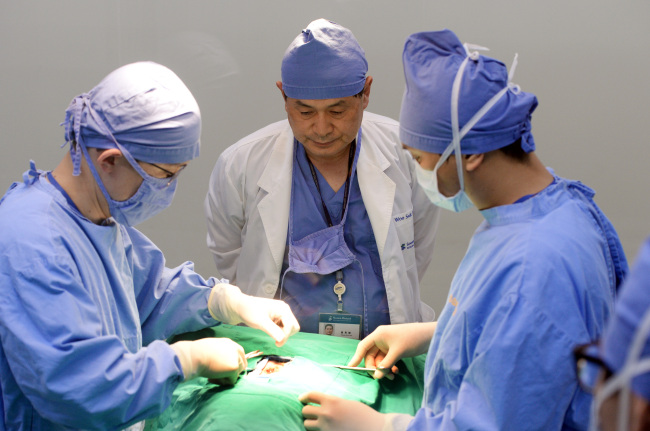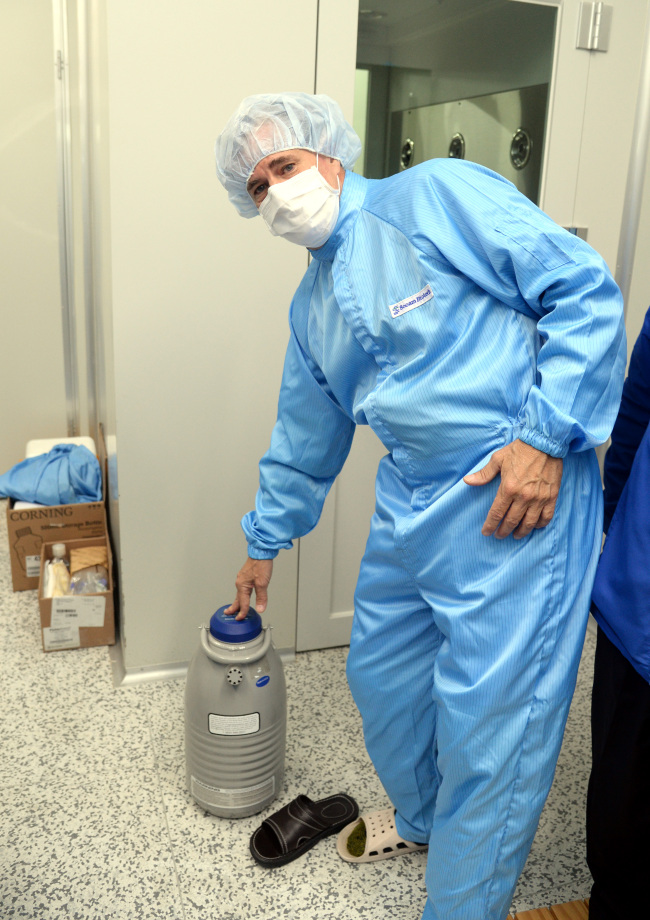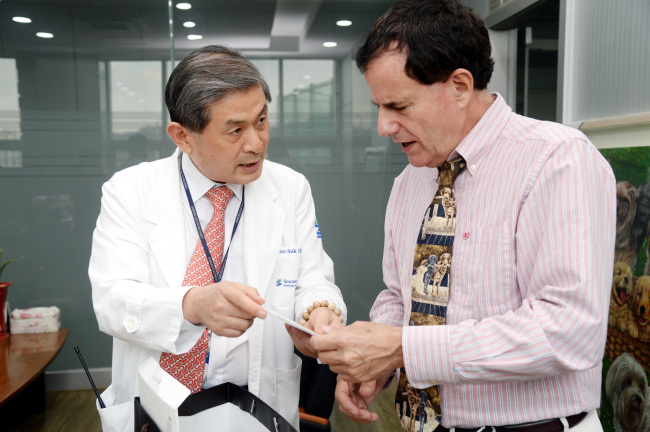Faithful pooch gets ‘new life’ via cloning
American to clone his faithful service dog thanks to once-disgraced scientist Hwang
By Yoon Min-sikPublished : Nov. 6, 2014 - 18:51
Davis Hawn arrived at the Sooam Biotech Research Foundation in Guro district, Seoul, at 2:30 p.m. on Wednesday. He was planning to ask South Korean veterinarian Hwang Woo-suk to clone his faithful 10-year-old dog Booster.

Hwang is one of the top minds in animal cloning despite his checkered career. He is credited with making the world’s first cloned dog, Snuppy.
By coincidence, a car carrying Booster’s blood cells pulled up just as he arrived at the facility.
“Coincidence? I don’t think so,” he said, taking it as a positive omen for the forthcoming procedure. “Somebody upstairs really likes him. He cheated death many times before.”
But Hawn said that the loyal canine’s most remarkable feature was not its resilience but the fact that it stood by his side during the lowest points of his life.
Booster came to the Mississippi man in his darkest hours. Ten years ago, Hawn had been the victim of an assault and a robbery by his friend’s stepson, someone who he said was “almost like a son.”

“He changed. I wouldn’t give him money to buy drugs,” he said. The young man stabbed Hawn and took his truck. When the authorities found Hawn’s truck later, they found a puppy in it.
“I didn’t want it, but I didn’t want it to die,” he said. He would get annoyed whenever people approached to pet the half-heartedly adopted puppy.
Traumatized by the experience and overcome with fear, Hawn bought a camper and started to travel around the world.
But when Booster -- once regarded as mere nuisance -- was hit by a car and nearly died, he realized that the dog was pulling him back to people.
Hawn noticed that dogs could act as a bridge between people, and started learning more about them. He eventually completed a Bergin University master’s degree program in Canine Life Sciences to become a dog expert.
The pair traveled to such places as Cuba, Thailand and the Bahamas to work with various people including children with AIDS. “My master’s thesis is ‘Project Fidelity,’ which … (is helping build a bridge) between the U.S. and Cuba,” he said, adding that he was able to communicate with many people during his trip to Cuba despite skepticism from his friends.
“My thesis is that a dog is a social lubricant that brings people together,” he said.

Despite the dog’s achievements during its short life span, Booster encountered a tough hurdle three years ago when it was diagnosed with squamous cell carcinoma. Doctors from Minnesota and Florida responded to Hawn’s pleas and provided radiation therapy to shrink the tumor.
Booster, who even received stem cell therapy, is now struggling to survive. Hawn said that time is running out for his dog.
“He cheated death so many times, now it’s a spiritual thing,” he said with tears welling up in his eyes. “It’s not just the dog, it’s a way of life. He saved my life, I saved his.”
In an effort to hold on to a part of Booster, he contacted Hwang, one of the leading scientists in the field of animal cloning. He said Hwang’s own emotional hardships helped him relate to the Korean scientist.

“Dr. Hwang has been on the highest emotional mountain in life, and the lowest emotional valley. I think this man understands that I have (gone through highs and lows), too,” he said.
The cloning procedure, of course, will not fully revive Hawn’s old friend. But he said it is meaningful to have a piece of him that lives on.
With the new dog, who will be named Boosted, Hawn wishes to carry out Booster’s legacy, which is to branch out and share the benefits that dogs can bring to people suffering from disabilities -- not just physically, but also mentally and spiritually.
“These dogs aren’t just dogs,” he said.
On the day of the procedure, Hwang greeted his guests with a sincere smile and appeared happy with the gift Hawn had given him: a painting of twin dogs that supposedly represents the cloned dogs at Sooam. Hawn watched as the veterinarian transferred the embryos embedded with Booster’s genes into a surrogate female dog.
Although Hwang disclosed the entire procedure to the press, he firmly declined to answer any questions from reporters, suggesting residual emotional scars from the research ethics scandal in 2006.
In 2004, Hwang’s reputation rose exponentially when the academic journal Science published a paper in which he claimed to have created an embryonic-stem-cell line from a cloned human embryo.
The discovery seemed to offer limitless possibilities via therapeutic cloning, such as rejuvenating dying tissues or even organs, giving hope to terminal patients around the world. Funds flooded in, as did an endless line of supporters, while Hwang was heralded as the golden boy who had taken Korea’s biotechnology to a new level.
The high hopes for Hwang crumbled the next year when he came under suspicion of fabricating his world-renowned paper. In 2006, an investigation committee of his then-employer Seoul National University concluded that his papers were fraudulent and subsequently expelled him from his post.
The public and the media, who had once hoisted the scientist upon their shoulders as a hero, labeled Hwang a liar and a fraud.
Eight years on, Hwang still refuses to talk to the media and maintains that he actually did create the cloned human embryonic stem cells. He even garnered some success in earning patents for his embryonic stem cells in several countries including the U.S., but he has yet to earn the recognition of his compatriots.
“Some people have suggested to Dr. Hwang that he should leave the country to do his stem cell research. I think he still has a strong will to continue his research in the field,” said one of Hwang’s associates. Sooam’s latest partnership with Chinese biotechnology firm company BoyaLife attests to such desire; the main purpose of the facility that will break ground next year is animal cloning, but it also involves stem cell research.
But he added that Hwang’s main stage will remain here, saying the researcher still has strong feelings for his home country.
By Yoon Min-sik (minsikyoon@heraldcorp.com)



















![[Today’s K-pop] BTS pop-up event to come to Seoul](http://res.heraldm.com/phpwas/restmb_idxmake.php?idx=642&simg=/content/image/2024/04/17/20240417050734_0.jpg&u=)